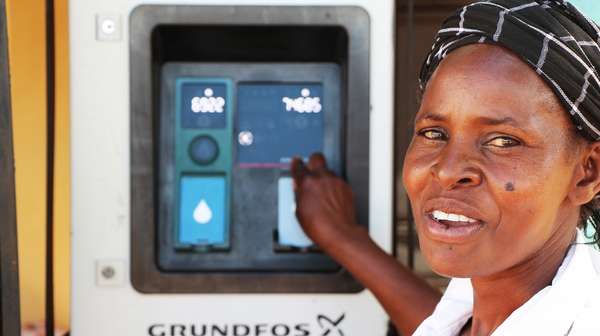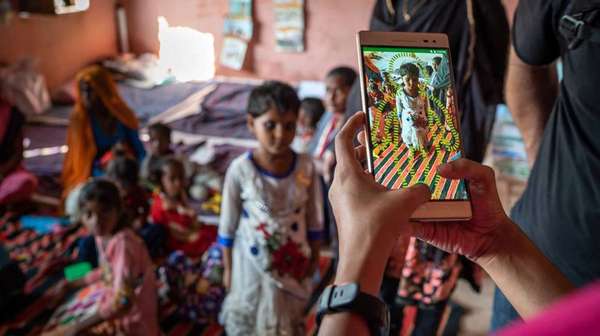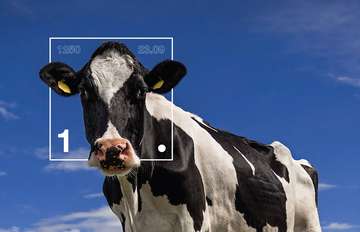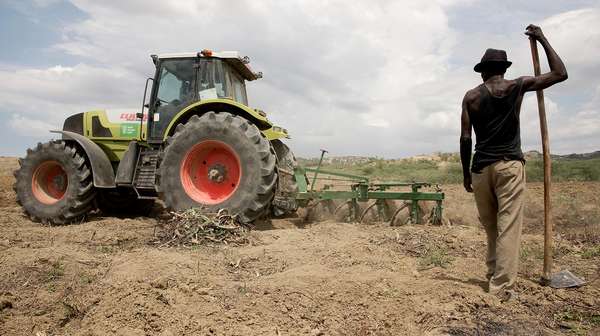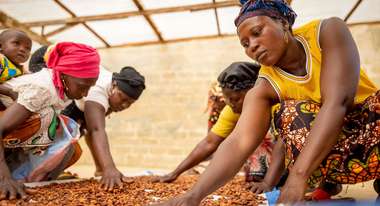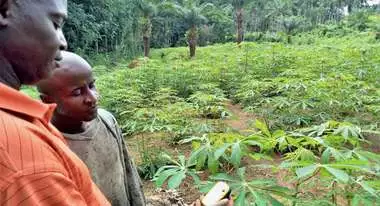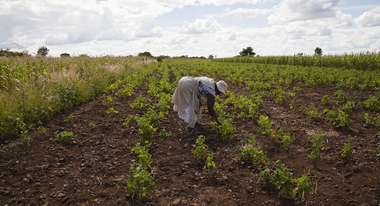How Welthungerhilfe is supporting innovative ideas and projects.
Corporate power in the digital agri-food system
Data is also the new currency in nutrition systems. Whoever controls it has the edge in the market.
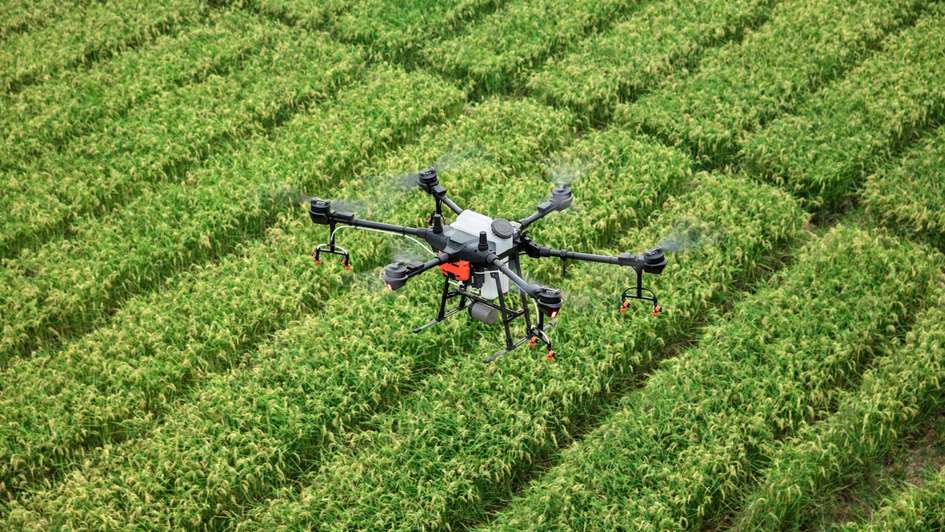
This article was originally published in the German-language "Fachjournal Welternährung" (World Food Security Journal).
The digitalisation of our agricultural and food systems is accelerating. Some speak of a 'digital revolution'. Others see it rather as a continuation and deepening of the industrialisation of agriculture - and thus of the existing structures of the agri-food system, which is characterised in particular by the dominance of a few large transnational corporations (Clapp and Ruder 2020; Prause et al 2021).
Digital technologies are now being used along the entire supply chains of agricultural products. At the beginning of the supply chains we see new forms of genetic engineering and data-based credit evaluations. Digitally enabled genetic engineering methods such as CRISPR technologies are now used to develop new, genetically modified seeds. Banks and insurance companies increasingly use farm data to decide on granting loans or insurances for farms. On the farms themselves, farmers in the global North as well as in the industrialised economies of Brazil and Argentina are using precision technologies - agricultural machinery that can apply fertilisers and pesticides in a more targeted and thus more economical way. Furthermore, the use of robots to harvest fruit and vegetables is expanding. And large corporations such as Bayer, the world's largest manufacturer of seeds and pesticides, also provide online platforms that offer farmers data-based decision-making support tools.
For this purpose, online platforms combine general data such as weather forecasts with the data of a specific farm. For example, recommendations are provided on the best time of the year for sowing.
Digital technologies are also playing a growing role in trade and transport. Multinationals are using blockchain technologies to monitor their entire supply chains and make them more transparent. And at the end of the supply chain, especially in the current pandemic, consumers no longer buy food only at the local supermarket, but also use delivery services. Digitalisation is therefore not only changing agricultural production on farms but shapes the functioning of entire food supply chains.
Corporate power in the agri-food system
How are these technologies changing the influence of transnational corporations in the agri-food system? The global agri-food system is characterised by a very strong concentration of large companies with global operations. This concentration has become even more pronounced in recent years, especially regarding inputs, following a number of major acquisitions such as Bayer's takeover of Monsanto or the merger of ChemChina and Sinochem, which was approved by the Chinese authorities in 2021. ChemChina had already taken over the Swiss company Syngenta in 2017.
The non-governmental organisation ECT Group has calculated that in 2018, four corporations (Bayer, Corteva, ChemChina and Limagrain) controlled 67 per cent of the global seed market. Similarly, in agrochemicals, only four corporations control 70 per cent of the global market. In grain trading, the largest four companies hold 90 per cent of the market share. A ratio comparable to that of the German supermarkets: Four large chains dominate about 85 percent of the market (Mooney 2018).
Such a concentration of market power in the hands of a few corporations, some authors also speak of oligopolies in the agri-food system, enables them to exert a very strong influence on pricing. German farmers, for example, regularly protest against the dumping prices of large supermarket chains for their products. Through lobbying, corporations also exert influence on politics - for example, by campaigning against bans on certain pesticides such as glyphosate or taxes on very sugary foods.
Augmented reality, shared economy and a multimedia information app: Welthungerhilfe is increasingly developing and using digital services to get closer to achieving the "zero hunger" goal.
Over the past decades, large supermarkets in particular have secured a central place in the agri-food system, setting both standards for food production and strongly influencing pricing through their control over supply chains and their concentrated market power. Digital technologies could extend the control of supermarkets or agribusiness wholesalers like Cargill over their global supply chains and the actors involved. Digital technologies can increase the transparency of supply chains in a positive sense for consumers when they learn, for example, where the cocoa in their chocolate comes from, how it was grown and harvested. At the same time, however, for producers, including small-scale farmers, this means that large buyers can exert greater control over agricultural production. For example, the large-scale companies and buyers can now detect more quickly, by monitoring fields with satellite or drone technology, if the producers do not want to or cannot comply with certain set regulations. In the worst case, this can lead to them no longer being able to sell their harvest.
Tech companies in the agri-food system
Capital from the technology sector is increasingly flowing into the food retail sector in particular and capturing market shares (Prause et al 2021). Supermarket chains, which until recently relied on established oligopolies and very little competition in many countries, are now facing new players due to digitalisation. Technology giants like Amazon or Alibaba are expanding grocery trade on their internet platforms. In the USA, Amazon took over the Whole Foods supermarket chain in 2017 and is increasingly combining online and offline food trade. However, tech companies are also investing in other areas of the agri-food system: China's Alibaba Group, for example, offers the ET Agricultural Brain - an artificial intelligence-based tool to improve fruit and vegetable production and pig farming. Alibaba's blockchain technologies are also used for traceability and transparency of food along supply chains.
Agribusinesses and digital technologies
But the traditional big players in the agri-food system have also upgraded digitally to increase their market power. They dominate digital technologies in agriculture and food wholesaling. The world leaders in seeds - Bayer, DowDuPont and Sinochem-ChemChina - have signed numerous agreements to gain access to basic patents for CRISPR technologies. DowDuPont succeeded in combining 48 basic patents into a common patent pool. These basic patents enable the full use of CRISPR technology in plant breeding. The company can thus offer bundled, non-exclusive licences to this patent pool - for a fee, of course. In particular, Dow-Dupont secures a new form of market power in this way; the group controls access to this technology, especially for smaller companies in the field of seed breeding (Then 2019).
In order to be at the forefront of future innovations, the leading agricultural corporations have also acquired a whole series of smaller start-ups and companies that have developed digital technologies for agriculture. Monsanto itself had acquired start-ups such as The Climate Corporation, which developed the successful farm management platform Climate Field View, prior to its acquisition by Bayer (Mooney 2018). At the same time, agribusinesses are expanding their own start-up incubators and venture capital funding.
Big Data and new forms of corporate power
Farm management platforms are an important area of action and investment in the agricultural sector. These platforms enable farmers to make data-driven decisions about the management of their farms. For example, crop data is transmitted directly from the harvesters to the platform, which combines it with weather data and possibly soil quality data to make recommendations for the next year's sowing.
The Swiss company Syngenta (now part of ChemChina-Sinochem) has also invested heavily in acquiring farm management platforms for "smart" solutions in seeds and crop protection. The group aims to be the only company with access to the leading digital platforms in the world's four main agricultural markets: USA, Brazil, China and Eastern Europe.
Through these platforms, agricultural corporations can collect large amounts of data about farms. However, major agricultural machinery producers such as John Deere and AGCO are also siphoning off data, as much of the data is collected in the first place via the sensors and GPS systems on their machines. In order to make full use of farm management platforms and digital farm machinery , farmers must disclose their personal farm data, as well as information about the quality of the soil and the crops they grow. Current law in Germany, Europe and the USA does not protect farm data from access by third parties, i.e. the agricultural corporations offering the services (Vogel 2020). Alistair Fraser (2018) coined the term “data grab” for this, which we are currently observing in agriculture.
The software platforms controlled by large corporations also produce so-called lock-in effects. On the one hand, the costs for using the platforms are low or zero, while they are high for switching to another provider (e.g. due to incompatibility of data formats). On the other hand, the large agribusinesses closely link the functions of farm management platforms to their own products and inputs - creating a further lock-in effect.
Syngenta's Chief Information and Digital Officer stated in an interview that the group does not believe it can make money by selling software for agriculture; instead, he sees farm management platforms as complementary to its core products (Rana 2020). Further lock-in effects for farmers occur when the farm management platform only offers recommendations for certain crops or even only particular seeds (Carolan 2020).
Conclusion
Digital technologies are already an integral part of the agri-food system. It is true that in the Global South in particular, very few producers have access to these technologies. Nevertheless, their production and ways of life are increasingly influenced by digital tools used along global supply chains. The currently prominent digital technologies for agriculture are developed and controlled by the large agricultural corporations. They enable global supply chains to be monitored even more closely. New questions arise about the autonomy of farmers, who may become even more dependent on large input producers through farm management programmes. The currently dominant digital technologies strengthen the power of large agribusinesses in the agri-food system and consolidate the currently dominant industrialised modes of production in agriculture. While people like to talk about the digital revolution in agriculture, in order to advance a real social and ecological transformation of the agri-food system, we need digital technologies that are
- developed collaboratively and with producers and published as open source programmes;
- protect farmers' data
- support socially and ecologically sustainable agricultural practices that enable an ecological transformation of the sector, instead of marginally improving the climate-damaging practices of industrialised agriculture (Fraser 2021).
AgriShare is a mobile phone enabled platform that links farmers without assets with commercial or private hiring services for production, processing and transporting.
There is a need to catch up here: digital technologies must be developed specifically to support agro-ecological and regenerative agricultural practices. The first steps in this direction have already been taken: there are companies such as RucolaSoft, which offer digital cultivation planners for vegetables specifically for solidarity farming. The Three Rivers Farmer Alliance, a network of farmers in the USA, has developed an app that allows restaurants, schools and shops to order food directly from local farms, thus expanding local distribution networks (Rotz et al 2019). FarmOS is a free, open source farm management platform developed by a community of farmers, developers, researchers and organisations. SpotFarming could also offer an alternative to the dominant form of digitalisation in the future. SpotFarming focuses on the needs of the individual plant - arable land is divided into small areas with the same characteristics and these are managed by autonomous robots according to location and individual plants.
However, for such technologies to be (further) developed and adopted on a larger scale, a different agricultural policy is needed that supports an 'alternative' digital infrastructure for agriculture and the agri-food system as a whole through regulation and targeted funding.
References
Carolan, M. 2020. Acting like an algorithm: Digital farming platforms and the trajectories they (need not) lock-in. Agriculture and Human Values. https ://doi.org/10.1007/s1046 0-020-10032 -w.
Clapp, Jennifer, and Sarah-Louise Ruder. 2020. Precision Technologies for Agriculture: Digital Farming, Gene-Edited Crops, and the Politics of Sustainability. Global Environmental Politics 20 (3):49-69. doi:10.1162/glep_a_00566.
Fraser, Alistair. 2018. Land grab/data grab: precision agriculture and its new horizons. The Journal of Peasant Studies 46 (5):893-912. doi:10.1080/03066150.2017.1415887.
Fraser, Alistair. 2021. ‘You can't eat data’?: Moving beyond the misconfigured innovations of smart farming. Journal of Rural Studies. doi:10.1016/j.jrurstud.2021.06.010.
IPES-Food. 2017. Too big to feed: Exploring the impacts of megamergers, concentration, concentration of power in the agri-food sector. www.ipes-food.org (18 Juni 2020).
Mooney, Pat. 2018. Blocking the chain. Industrial food chain concentration, Big Data platforms, and food sovereignty solutions. Berlin and Val David: ETC Group; GLOCON; INKOTA-netzwerk e.V.; Rosa-Luxemburg Stiftung.
Prause, Louisa, Sarah Hackfort, and Margit Lindgren. 2021. Digitalization and the third food regime. Agriculture and Human Values (38):641–655. doi:10.1007/s10460-020-10161-2.
Rana, S. 2020. Interview: Syngenta’s digital offerings will effectively accompany its core CP/seed products. Agrow. https ://agrow .agrib usine ssint ellig ence.infor ma.com/AG032 365/Inter view-Synge ntas-digit al-offer ings-will-effec tivel y-accom pany-its-core-CPsee d-produ cts. (18 Juni 2020).
Rotz, Sarah, Emily Duncan, Matthew Small, Janos Botschner, Rozita Dara, Ian Mosby, Mark Reed, and Evan D. G. Fraser. 2019. The Politics of Digital Agricultural Technologies: A Preliminary Review. Sociologia Ruralis 59 (2):203-229. doi:10.1111/soru.12233.
Then, C. 2019. Neue Gentechnikverfahren und Pflanzenzucht: PatenteKartell für große Konzerne. In Rundbrief 2, Ed. Forum Umwelt und Entwicklung, 10–13.
Vogel, Paul. 2020. Datenhoheit in der Landwirtschaft 4.0 Rechtliche Aspekte der Verfügungsbefugnis über Betriebsdaten und denkbare Regelungsansätze zur Stärkung der Datenhoheit, in: Gandorfer et. Al. Digitalisierung für Mensch, Umwelt und Tier, Lecture Notes in Informatics (LNI), Gesellschaft für Informatik, 331-336.





